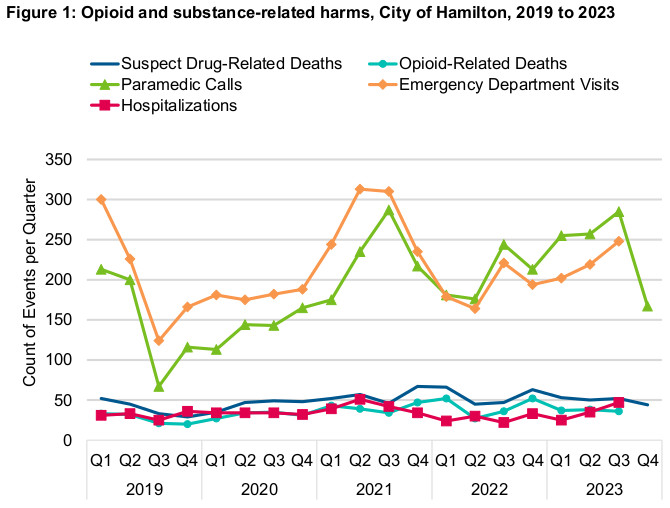Following months of delays, a pilot program proposed by a trio of Hamilton, Ont. non-profits to embed harm reduction staff and services into men’s shelters is now a go.

The initiative will essentially duplicate a YWCA model at Carol Anne’s Place on MacNab Street, aiding women, the trans community and non-binary people, which has successfully handled hundreds of clients and reversed over 50 drug poisonings last year.
Good Shepherd COO Katharine Kalinowski says similar services for men will be coming through a 12-month trial that aims to alleviate the city’s disproportionately high opioid death rates among males.
“So our hope is to have skilled workers working alongside our existing staff and also pier workers in making engagement with people with lived experience,” said Kalinowski.
City politicians cleared the way last week for $300,000 from a soon-to-be no-more health services reserve to be put into the pilot.
The original proposal, presented by Good Shepherd, Mission Services and the Salvation Army in January, sought $600,000 for an 18-month pilot “to implement a shelter-based harm reduction staffing enhancement.”
However, city politicians voted to wait for further direction from public health after many wondered whether spending the was the best way forward.
The city’s director of Housing Services says that $600,000 will now be split between the men’s shelter and the existing Safer Use Space at YWCA for 12 months.
“This is an adaptation of the original pilot, in that it is for a lesser time period and results in a lesser funding allocation to this specific piece,” the city’s Michelle Baird explained.
An additional $67,000 under the city’s Opioid Action Plan will provide peer support workers for those unhoused and in encampments.
In early April, public health officials revealed paramedics responded to 964 suspected opioid overdose incidents last year, 50 more than the previous high of 914 reported in 2020.
Most of those calls were tied to men between the aged 30 and 60 years of age, with the average calls per month around 80 over the 365 days.
There were 199 suspect drug-related deaths in Hamilton during 2023 with 111 of those were either confirmed or suspected opioid-related deaths, according to the city’s Epidemiology and Wellness Division.

The division believes 65 per cent of suspected drug-related deaths in the city occurred in a private residences, while 89 per cent of all opioid-related deaths involved more than one substance.
Mission Services Associate executive director of programs Shawn MacKeigan says they’ve already been delivering the services in advance of government funding and expects the city’s funds will help scale up what they have.
“We’ll direct what is available for our organization to further enhance our current offering,” he said. “The success of which helped form the original rationale for embedding (men’s) harm reduction supports in shelters.”
MacKeigan says about three years ago amid the pandemic they saw “large spikes” in overdose-related incidents, including a high watermark of 80 overdoses in 2021 at their east-end hotel shelter.
In response, the agency introduced a pilot similar to the current pilot that reduced opioid-related outcomes by about 40 per cent in 2022 through enlisting staff working “through an addictions lens.”
Hamilton is in an opioid overdose and poisoning state of emergency, declared in April 2023 in the hopes of securing assistance from the other levels of government.
An accompanying Opioid Action Plan with community partners has sought to scale up supervised consumption sites in addition to expanding drug-checking resources and streamlining treatment services.
At present the city has just a single dedicated consumption and treatment service (CTS) on James Street South run by the Hamilton Urban Core Community Health Centre (HUCCHC) which roughly sees 640 service visits in a month.
The agency is seeking a second consumption and treatment service (CTS) for the city.


Comments